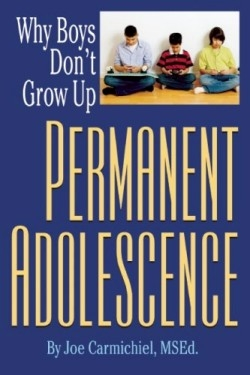
Permanent Adolescence
Why Boys Don't Grow Up
Joe Carmichiel doesn’t need to read the newspaper or watch the evening news to learn about the distressing state of America’s youth. As a high school English teacher, he gets daily, up-close views of students who are completely inept at handling the academic environment or basic social interaction. He’s noticed that boys are especially lacking in these competencies, and seem unconcerned about advancing to more mature levels. Carmichiel states, “A large number of today’s teenagers, especially boys, see no reason to accept or pursue adulthood since it is of so little value to the larger culture.”
One reason for this troubling situation is that society has forsaken the coming-of-age practices that for generations were vital in helping boys transition into adulthood. Today many male adults neglect their roles of mentor and guide for their sons, possibly because they never experienced them during their own adolescence or simply because they do not have a meaningful presence in their children’s lives. Boys are left on their own to navigate the growing-up process.
Carmichiel also explores the effects of modern culture. Boys constantly see and hear the emphasis on youth and staying young, and they disengage from social contact by spending countless hours alone playing video games or being “entertained” by television. Communication skills are practically non-existent, so boys do not develop appropriate ways to express themselves. The creative aspects of the mind lack nourishment and stimulation, stifling any emotional or artistic release. Often violence becomes the outlet for making a statement about their feelings.
A third major factor Carmichiel explains is the failure of the educational system to adequately adapt to the learning needs of boys. He asserts that schools and teaching methods are advantageous to girls, and boys eventually tune out the instructors since they become frustrated and see little chance of succeeding.
Carmichiel does a masterful job of weaving in plenty of statistics and supporting information throughout the book without getting bogged down in unnecessary details. He thoroughly examines each topic and passionately leads his reader through the complex causes and influences related to a boy’s adolescence and offers helpful suggestions for dealing with them. Permanent Adolescence would be insightful reading for educators, parents, or anyone interacting with young—or even adult—males.
Disclosure: This article is not an endorsement, but a review. The publisher of this book provided free copies of the book to have their book reviewed by a professional reviewer. No fee was paid by the publisher for this review. Foreword Reviews only recommends books that we love. Foreword Magazine, Inc. is disclosing this in accordance with the Federal Trade Commission’s 16 CFR, Part 255.
